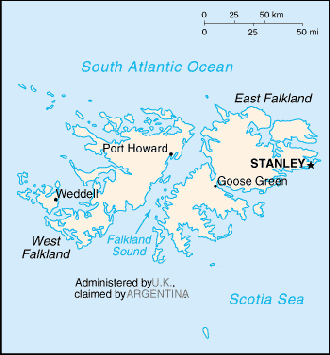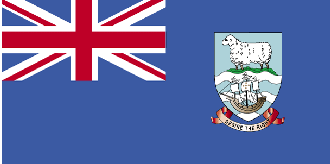
|
Falkland Islands
Background:
Although first sighted by an English navigator in 1592, the first landing
(English) did not occur until almost a century later in 1690, and the first
settlement (French) was not established until 1764. The colony was turned over
to Spain two years later and the islands have since been the subject of a
territorial dispute, first between Britain and Spain, then between Britain and
Argentina. The UK asserted its claim to the islands by establishing a naval
garrison there in 1833. Argentina invaded the islands on 2 April 1982. The
British responded with an expeditionary force that landed seven weeks later and
after fierce fighting forced Argentine surrender on 14 June 1982.
Location:
Location: Southern South America, islands in the South Atlantic Ocean, east of
southern Argentina.
Area: Total: 12,173 sq km note: includes the two main islands of East and West
Falkland and about 200 small islands.
Area - comparative: Slightly smaller than Connecticut .
Coastline: 1,288 km.
Climate and Terrain:
Climate: Cold marine; strong westerly winds, cloudy, humid; rain occurs on more
than half of days in year; average annual rainfall is 24 inches in Stanley;
occasional snow all year, except in January and February, but does not
accumulate.
Terrain: Rocky, hilly, mountainous with some boggy, undulating plains.
Natural resources: Fish, squid, wildlife, calcified seaweed, sphagnum moss.
Geography - note: Deeply indented coast provides good natural harbors; short
growing season.
People:
Population: 2,967.
Ethnic groups: British.
Religions: Primarily Anglican, Roman Catholic, United Free Church, Evangelist
Church, Jehovah's Witnesses, Lutheran, Seventh-Day Adventist.
Languages: English.
Government:
Dependency status: Overseas territory of the UK; also claimed by Argentina.
Capital: Stanley.
Economy overview:
The economy was formerly based on agriculture, mainly sheep farming, but today
fishing contributes the bulk of economic activity. In 1987 the government began
selling fishing licenses to foreign trawlers operating within the Falklands
exclusive fishing zone. These license fees total more than $40 million per
year, which goes to support the island's health, education, and welfare system.
Squid accounts for 75% of the fish taken. Dairy farming supports domestic
consumption; crops furnish winter fodder. Exports feature shipments of
high-grade wool to the UK and the sale of postage stamps and coins. The islands
are now self-financing except for defense.
Statistics:
Radio broadcast stations: AM 1, FM 7.
Radios: 1,000.
Television broadcast stations: 2 (operated by the British Forces Broadcasting
Service) note: cable television is available in Stanley.
Televisions: 1,000.
Internet users: NA; however one-half of all households are reported to have
internet access.
Highways: Total: 440 km, paved: 50 km, unpaved: 390 km.
Airports - with paved runways: 2,
with unpaved runways: 3.
Return to Visiting Locations
|

